This MRSA natural cure is easy to use at home, without antibiotics, using herbs, essential oil, and other natural remedies that you might already have at home. These 10 natural remedies will give you the best chance to stop an MRSA infection so you can get back to doing the things you love.
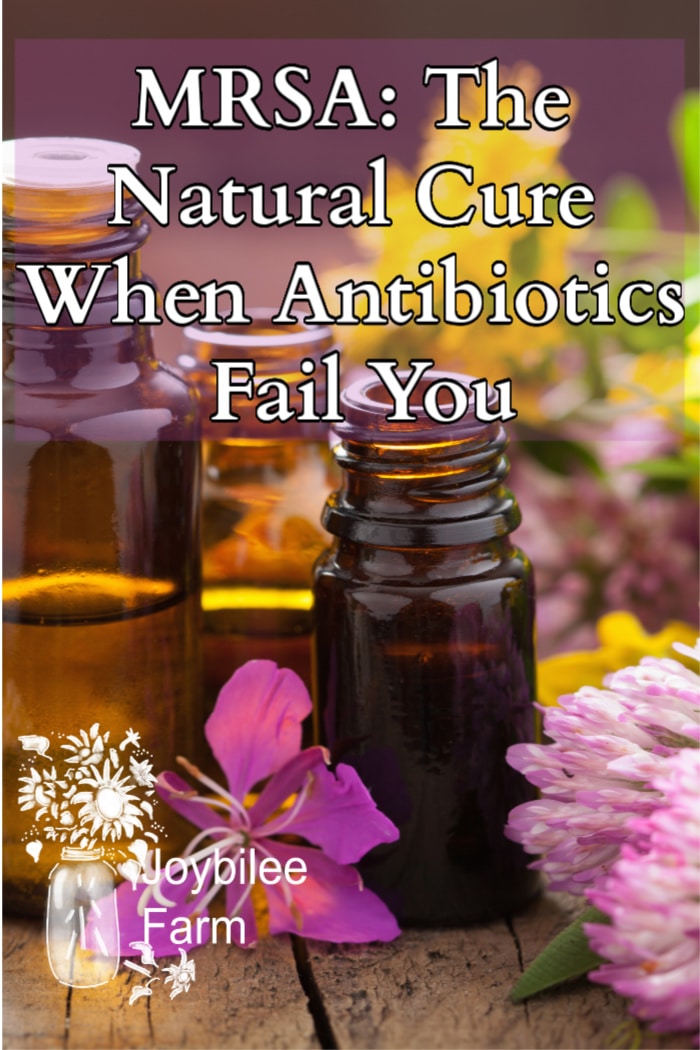
Fighting MRSA naturally
Every year 19,000 people die from antibiotic-resistant staph infections. 90,000 people end up in the emergency room. Many of these are children, according to the MRSA research center at the University of Chicago.
Last week, I had put some cow’s milk in my coffee and within a few hours, my scalp was covered in hives – about 8 of them – an allergic reaction to the milk. The hives burst a few days later and mostly went away, except for one. That one turned into a boil and an MRSA infection. Normally, applying tea tree essential oil to the infection would be enough to take care of it overnight, but my house has been sick lately, so my immune system is a bit over-worked.
My friend Amy recently posted her method of dealing with MRSA infections – applying heat and tea tree oil to the site of the infection. I wanted to elaborate on this because I think that this is a very useful homestead skill to know and use. Also, it’s a natural healing remedy that is accessible to everyone, even those without herbal education.
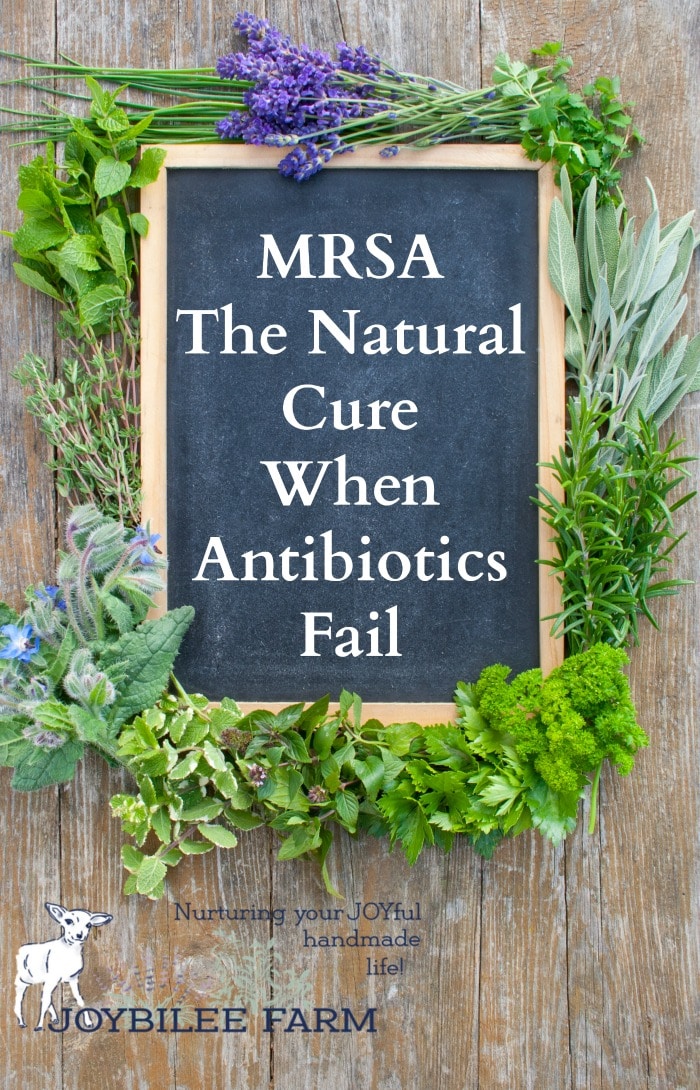
First, let’s look at what an MRSA infection is:
An MRSA infection is an antibiotic-resistant staph infection that usually appears on the skin. Staph bacteria are present on your body normally and it’s only if your immune system gets overwhelmed that it becomes problematic. Normally your body can deal with it using normal immune responses. Making sure you have times to de-stress and relax built into your day, and making sure to consume immune supporting foods can help keep your immune system strong.
MRSA Skin infections
The following is for skin infections. Should the area redden and swell or your condition worsens, please see a doctor immediately. MRSA infections can lead to death and organ damage. However, if caught early this method can help you overcome.
MRSA infection presents as a skin infection with redness, puffiness and sometimes an area of broken skin in the center, much like a spider bite but without the itching. Under the broken skin are often puss, inflammation, and infection.
Antibiotic ointment is ineffective in dealing with the infection. The infection, if left untreated can persist for weeks, it can move to surrounding tissue, and it can spread to family members from contact with an infected wound or by sharing personal items, such as towels or razors, that have touched the infected skin.
A chronic MRSA infection can spread, with scabbing, and scarring, while it runs down your immune system, into your bloodstream, joints, and organs. Antibiotics won’t take it away. In fact, using antibiotics to try to fight it can result in mutations that make the MRSA bacteria even stronger and more difficult to fight. But natural remedies like heat, herbal remedies, and essential oils are very effective in supporting your immune system to fight it.
The antibiotic-resistant bacteria that cause MRSA infections are present on the skin and in the environment. It is only when the body’s immune defenses are compromised, or the number of bacteria in the environment too numerous, that the body succumbs to infection. But once the infection takes hold, it is very difficult, by normal OTC or prescription means to eradicate it. It often leaves a low-grade infection that flares up the next time the immune system is compromised. This low-grade infection is highly contagious and likely to be passed on to other family members.
10 MRSA natural cures
- Heat
- Essential Oil
- Drawing poultice
- Hand expression
- Cleansing
- Manuka Honey
- Colloidal Silver
- Garlic infused olive oil
- Activated Charcoal
- Oregano oil (wild thyme)
Applying Heat:
Heat draws blood flow to the area and can begin to destroy the harmful bacteria. Use a damp cloth or heated flax bag to increase the heat to the area. If the infected spot can be soaked in a tub of water, or bowl of water, that’s the best way to increase the heat to the area. Adding a cup of salt or magnesium chloride to the soaking water can increase the effectiveness of this. This is especially effective if the infection involves your hands or fingers.
If it’s on a place where this is difficult to soak, like your head, or shoulders, use a damp cloth, that is kept hot with a heated flax bag. Keep the heat for at least 20 minutes, replacing the heated cloth as necessary. Your aim is to increase the heat and circulation to the infected area. Learn how to make your own flax bag here.
Essential oils to use with an MRSA infection:
Several essential oils are effective in combating MRSA infections. These essential oils are just some of the many essential oils used to effectively cure MRSA infections naturally. Choose one essential oil or a combination as you prefer.
Dilute the essential oil before using it so that you don’t create sensitivity or allergy. Essential oils are quite strong. Use a single drop of essential oil in 1 teaspoon of virgin olive oil. Apply a small portion of this diluted essential oil mixture to the wound site.
Amy suggested tea tree essential oil, and I concur with that. Tea Tree is very effective in dealing with an infection. Tea Tree essential oil is antibiotic, antiseptic, and anti-fungal. I’ve used it on my homestead to effectively combat strep boils, staph infections, and mastitis in my goats (when rubbed on the udder it is one of the few treatments that permeate the inside of the mammary glands to combat infection.) It’s the first oil that I grab when dealing with MRSA infections. Bacteria cannot develop immunity to it.
Peppermint essential oil is another antimicrobial essential oil. It has a cooling effect, so keep this in mind if you intend to use it near your face. It can make your eyes water.
Lavender essential oil is antibiotic, anti-fungal, and uplifting and relaxing, provided that you are not allergic to it.
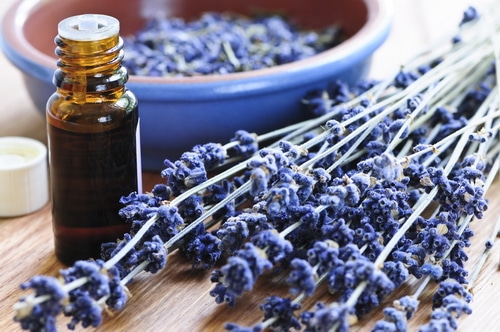
Clove essential oil is the essential oil used by dentists to numb your gums before injection of Novocaine during dental work. It is a strong antimicrobial and is strongly scented, almost overpowering. It is one of the ingredients in Marseilles Remedy-5 thieves’ essential oil blend, used during the Black Plague
Rosemary essential oil is one of the more expensive essential oils on this list. It is antiviral, antimicrobial, and warming. It is useful when there is pain involved as, like peppermint, it acts as an anti-inflammatory as well.
Marseilles Remedy – 5 thieves essential oil blend – This is a propriety essential oil blend that is available from several companies under different names. During the plagues of the Middle Ages, some thieves robbed the bodies of the dead taking their jewelry and valuables. The thieves kept from getting sick by washing their bodies with vinegar that had herbs and spices steeped in it. The herbs and spices commonly used were cinnamon, lavender, cloves, lemon peels, and rosemary branches. Today these spices, along with eucalyptus are combined as essential oils and sold as propriety essential oil blends. The basic value is that this blend is antimicrobial, antiviral, and anti-fungal – making it useful in the treatment of MRSA infections.
Drawing poultice for an MRSA infection
A drawing poultice acts by bringing moist heat to your skin, along with an agent that creates an irritation to increase the blood flow to the area. As the blood flow increases it pushes the infection to the surface of your skin, often bringing the boil to a head, where it can be drawn out of your skin with pressure. Alternatively, the heat and irritation help your own white blood cells fight the infection without breaking the skin.
You’ve probably heard of mustard plasters, flax plasters, and bread poultices. These are examples of drawing poultices. A drawing poultice can be made from plantain leaves, a slice of onion, or pine pitch to draw the infection out of deep tissue and bring it to the surface of the skin where it can be expressed with heat and pressure, or where your white blood cells can attack it.
Amy recommended using a slice of onion. This was new to me so I gave it a try. As I was chopping onions to put in the crockpot for dinner, I sliced off the top of the onion. This gave me a rounded closed sliced that was just big enough to anchor in place with a couple of plaster bandages. Within a few minutes of taping this over the hard MRSA nodule in my shoulder, the area started heating up, a natural response to the onion juice in the slice. The treatment needs to be reapplied every 12 hours until the infection is drawn out.
This area was the leftover from a mosquito bite in 2011. It periodically swells to a tender boil and weeps, leaving behind a small, hard nodule in the muscle. It is in a spot that is hard to get any kind of plaster on. I periodically apply tea tree or lavender essential oil to try to shrink the spot. Last month I applied the Marseilles remedy twice a day for a week and it burst, leaving behind the present, hard nodule. Since it didn’t seem to be improving beyond that, it was worth trying Amy’s onion poultice, to see if the last remnant of infection can be drawn out.
Red Alder and Tag Alder
Two native North American trees, Tag Alder on the East Coast and Red alder on the West coast are strong antimicrobial and antifungal herbs. A tincture can be made using the catkins and inner bark of new growth, which offers both antimicrobial and antifungal benefits. Alder is one of the strongest antimicrobial assets in the North American landscape. You’ll find it growing near stream banks and in many of the same places that you’ll find willow and birch. Every region has its own native species that has been used for centuries and Alder (Alnus rugosa; A. Rubra) is ours in North America.
Hand-expression of an MRSA infection
Sometimes, with the application of antimicrobial essential oil and heat, your body can fight the infection on its own, and this step is unnecessary.
Once the infection has been drawn to a head and you think you can apply a bit of pressure to express the infective tissue, apply heat once more.
Apply tea tree oil or the essential oil of your choice to surrounding tissue to stop the spread of the infection beyond the current area.
Take a clean disposable paper towel or several layers of tissue, and put it over the spot to catch the infective material. You don’t want to spread the infection – so don’t use a handkerchief for this, it must be disposable. Clean hands and clean technique are a must here.
Cover the wound and squeeze with your thumb and forefinger applying steady pressure to the base of the infection. This should move the infective material to the wound opening. If it doesn’t it may not be ready to be expressed. If not, apply the poultice with heat for 4 more hours and try again.
If a wound is already made in the spot, gentle and firm squeezing should cause the puss to come out. Catch it all in the tissue, dispose of it immediately.
Cleansing the area and applying an essential oil
Cleaning the infection site and frequent hand washing is an effective way to keep MRSA from spreading. Wipe the area with a clean, hot cloth and apply tea tree oil once again. Bandage if necessary. You don’t want the infectious material to weep onto clothing or furniture.
Frequent hand washing is effective in keeping MRSA infections from spreading through your household. If you have an active MRSA infection in your home, be sure to wipe doorknobs, light switch plates, and taps with vinegar-citrus cleaner or thieves vinegar regularly to keep the infection from spreading.
Manuka Honey as an MRSA natural cure
Manuka honey is tested and proven MRSA natural cure. Manuka honey is single species honey produced in New Zealand from the nectar of the manuka bush. Honey was used for medicinal purposes from ancient times. Manuka honey is set apart for your local raw honey because of its antimicrobial properties and its natural enzyme profile. These enzymes are the precursors to hydrogen peroxide. The combined antimicrobial power with these natural enzymes makes manuka honey very effective in relieving boosting the body’s own immune response to alleviate MRSA infections. The honey is safe for both internal and topical use.
Manuka honey is graded on a scale of 0 to 20, with 4 to 9 being normal table use. This grade of manuka honey shares the same health profile as any other raw, local honey. The next grade is 10 to 14, the maintenance level for increased vitality and stamina. Grade 15 to 19 offers therapeutic and antibacterial benefits to support natural healing. Grades 20 or higher, like this one, are reserved for medicinal and therapeutic use. The higher levels of manuka honey should only be in limited amounts with no more than 1 tablespoon per day. Those who are allergic to bees, honey, and bee venom should use caution when eating or using manuka honey topically.
Colloidal Silver as an effective MRSA natural cure
Colloidal silver is an effective and proven MRSA natural cure. Colloidal silver is antimicrobial, antiviral, and antifungal. Topical and internal use of colloidal silver can support the body’s natural healing mechanisms and immunity. Hospitals use colloidal silver-impregnated bandages and dressings to prevent infection and to treat skin problems.
It’s important when using colloidal silver internally to choose a product that has a small particle size in the nanoparticle range, like this one. or this one.
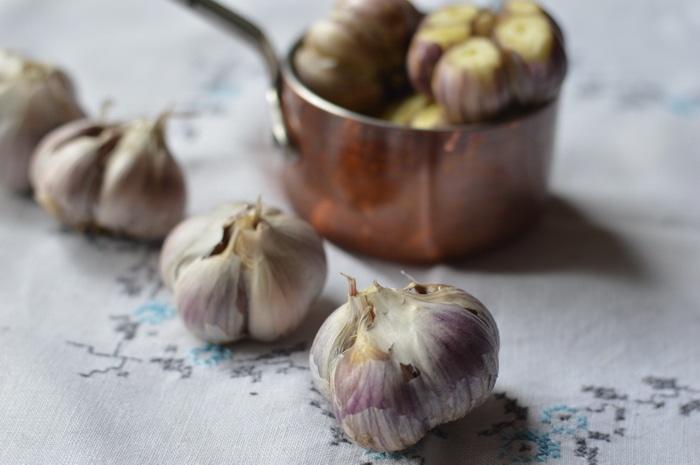
Garlic and Garlic Oil
Raw garlic and garlic-infused olive oil are antimicrobial, antifungal, and antiviral, aiding the body’s natural healing and immune responses. You can take a raw garlic clove on a spoonful of honey to make eating garlic easier. For topical use, infuse raw, organic garlic in olive oil for a week. The garlic must remain in its raw state for optimal antimicrobial strength. Do this in the fridge to avoid the growth of bad bacteria in the oil, before the oil is fully infused with garlic oil.
Use garlic infused oil full strength on MRSA infections, cover with a bandage and leave for a few hours before washing off with soap.
Activated charcoal
Activated charcoal acts as a poultice to draw out and bind with toxins in the skin. It has a purifying effect on the skin, breaking the cells of the bacteria and removing them from the body.
To use activated charcoal as a poultice for an MRSA natural cure: Mix 1 teaspoon of activated charcoal with a 1/4 teaspoon of olive oil that you’ve added a drop of tea tree oil to. Use as a poultice on boils or infected skin. Cover with a bandage to keep clothing and bedding from getting soiled with the charcoal. Charcoal can be messy.
Oregano Oil
Oregano oil comes from the wild thyme growing in the mountains around the Mediterranean. It is used as a natural antimicrobial with an affinity for lung issues. It’s commonly taken for coughs and colds. But because of its antimicrobial and antifungal effects, it is often used to support the body’s immune defenses against bacterial infections like MRSA.
It is strong tasting and can burn a little when you take it orally. Look for oregano oil with a high carvacrol percentage like this one.
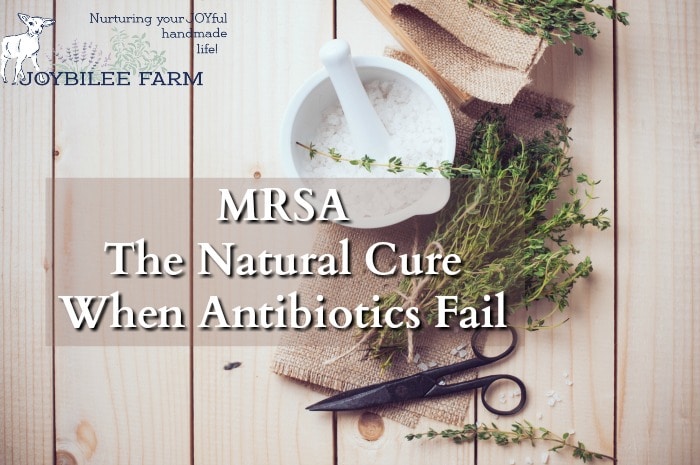
Variety is the best MRSA natural cure
When trying to cure a persistent infection like MRSA sometimes switching natural remedies after a week or two is the best way to handle it. We’ve found that sometimes even natural herbs work for a little while and then seem less effective. Switching the remedy after a week or two can sometimes be the best strategy for actually stopping a persistent MRSA infection.
In addition to natural remedies, your immune system can be supported by a healthy diet, rich in antioxidants, low in sugar and processed foods, adequate rest, and moderate exercise to increase your circulation and speed recovery. Natural remedies work by supporting the body’s innate ability to heal itself. By ensuring that your body has the best building blocks you have the best chance to heal.
A step by step Herbal Protocol you can use at home:
People have called me at home asking for a protocol they could use to treat their own MRSA infections. I’m not a doctor. But Naturopath Eric Yarnell is. His herbal protocol for working with both skin MRSA and internal MRSA infections effectively with herbs is available online. Download and print a copy of this protocol for your own use here. It involves removing all sugar from the diet, eating a healthy diet rich in fruits, vegetables, green tea, and chocolate, taking 3 to 5 raw garlic cloves a day and a mixture of antimicrobial and immune-supporting herbs to support the body in fighting infection. The herbs are listed in the protocol. Dr. Yarnell’s protocol lists many of the recommendations I’ve listed here.
The DIY Herbal Apothecary course
Many of the natural remedies described in this article were common household remedies used for centuries. Some have been tested with rigorous scientific experiments, like Manuka honey and colloidal silver, but many have not. However, herbal remedies are the people’s medicine, learned through trial and error through the centuries. When you are ready to take this knowledge back for your own family, a good start is to create a DIY herbal medicine toolkit. My course can help you do exactly that.
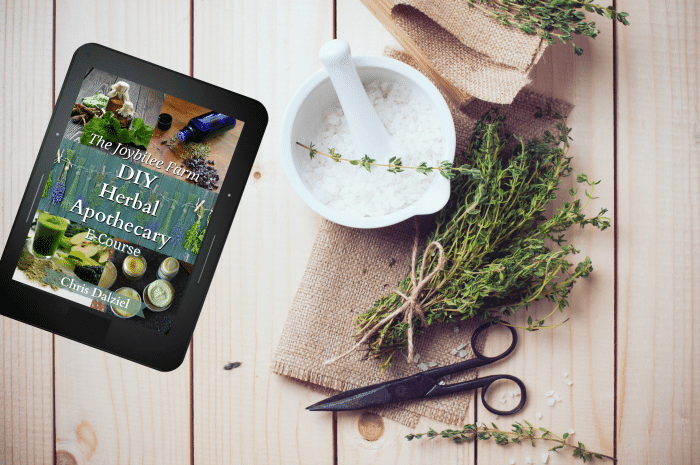
To find out how you can create your own effective and inexpensive herbal apothecary check out my course here.
Note: This post is not to diagnose or treat any illness. Please do your own due diligence. Consult your own naturopath or doctor to determine the best action in your personal circumstances.




You may have GERD or need a stomach med so your stomach acid is not wrecking the throat while you sleep. In addition to whatever else is going on!
Was the oil of Oregano used topically or orally? What else was used?
I find aloe gel helps too
Castor oil works especially with heat.
I currently dont have a boil atibioticts arent work in I don’t know what to do